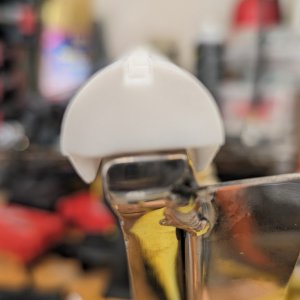Absolutley not.
You may have sucessfully moved the moisture from the carpet fibers, but where did the moisture go?
A washing machine hose puts out a lot of water in a short time. Even if its shut off within minutes it still can create a signifigant amount of moisture.
In this situation extraction is the first and obvious step. I'm not going to teach ASD on the BB and give away the secret of how to test your extraction(no offense, but that could only make a lot of people dangerous).
The next thing after the bulk water is removed is to find out where did the water go? Dry wall wicks moisture as soon as it contacts it. Water likes to follow gravity? Water creates pressure as it quantity increases. Only a trained technician with quality detection equipment will be able to find it.
Anyways, after the moisture is found, then it must be dealt with. One air mover simply is not effiecient for drying a loss like this. The S500 makes recomedations for airmover quantity based on a lot of research. The purpose of airmovers is to 1)break the surface tension of the wet surface and move the boundry layer of air and 2) transfer energy to the water to create evaporation. Basically, airmovers create evaporation. We spend a lot of money to accelerate this phase of the drying process, because it is truly the bottle neck of drying. That is why TES and ETES are popular.
An ETES or TES would dry the carpet and pad over night, but the walls would require a day. There just is no way that an air mover placed on top of the carprt would dry the pad over night.
Once the water is evaporated where is it going to go? Based on several factors, a decision would have to be made to either evacuate it or capture it in a dehumidifier. In most cases, dehumidification is the natural and the appropriate choice. Being in Nevada, with the proper knowledge, it is feasible that a technician could sucessfuly evacuate the moisture from the building more efficiently than dehumidification.
Capturing or evacuating the moisture is critical because as it evaporates from the affected surface, the vapor pressure in the affected area builds and will seek equilibrium by penetrating other surfaces such as walls, ceilings, furnishings, etc.
Another thing to consider is documentation and insurance. Not his insurance.....yours.
Did you sucesfully document all of the moisture and the completion of the job. Did you follow the S500 standards? Do you have fungal coverage on your insurance.
ALL carpet cleaning and contractor GL policies all have fungal exclusions. WDR contractors have to purchase CPL (Contrator/Commercial pollution liability) policies to protect us from the exposure we have doing our trade.
If this customer finds mold in his house....ever...and some one gets sick you could be sued, and you really do not have a defense, and probably not the money for a defense. The average mold lawsuit award in our industry is $275,000.00, with awards in the millions not uncommon.
I'm not trying to berate you. Infact I commend you for your wanting to serve your customer and resolve his situation for him. If you truly want to enter the wonderful world of WDR, start reading our posts and take the steps. It does require a lot of commitment and cash to do ot right, but the challenges far exceed those found carpet cleaning...but so are the risks.

